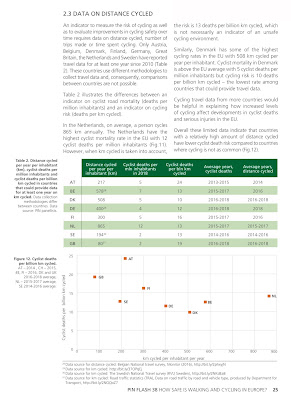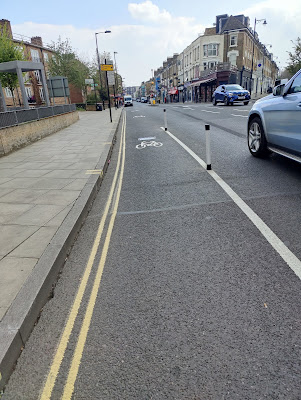The cycle bloggers and campaign groups such as the London Cycling Campaign (LCC) are forever extolling the virtues of cycling in the Netherlands. In 2012 the LCC ran a campaign to persuade the Mayor of London, Boris Johnson, that London should ‘Go Dutch’. It was implied that cycling in the Netherlands is much safer than in Great Britain.
It is the case that on a ‘per kilometre’ cycled basis fatalities are lower. However, in absolute numbers, the Netherlands has twice the number of cycling fatalities than Great Britain, but with a population one quarter ours. I have tried to bring this to people’s attention because it’s important. But I was effectively silenced. The person who prompted the suppression of my views would, you’d have thought, been in favour of free speech and intellectually interested in alternative points of view.
Christian Wolmar, journalist, and London Cycling Campaign board member (Chair of the HR Committee), wrote twice last year to my employer complaining about comments on my personal Twitter account. Until now I have been unable to respond. In August he wrote:
“I have been concerned about his Twitter posts for some time but the final trigger which has prompted this email is a recent post in which he used statistics in a completely dishonest way. In this post, Mr Stops argues that to ‘Go Dutch’ risks an increase in cycling fatalities because that is what has happened in the Netherlands. This is a misuse of statistics on a Trumpian scale. Of course there are more fatalities in the Netherlands because cycling levels are many times greater than in the UK. The relevant statistic, as Mr Stops must know, is the rate of deaths per million miles cycled, which is far lower than ours. This is a plain misuse of statistics, using a highly partial selection in order to fit in with Mr Stops’ views.”
His complaint went on:
“I would be very interested to know if this is something that is allowed under your employment terms and, if not, whether you will ask Mr Stops to desist from making these attacks.”
Below is the thread he complained about. My tweet makes the point that the absolute number of cycling fatalities in the Netherlands in 2018 was 228 and in Great Britain 99. And that the Netherlands has a population a quarter the size of the GB. I highlight this because it is a big deal. People ought to think about the consequences of ‘going Dutch’. I believe we should do much better than the Dutch, or there will be many more cycling fatalities on our roads.
One should be careful with statistics. The number of fatalities can be ‘normalised’ in different ways, and it is true that there is a lot more cycling per head of population in the Netherlands than in Great Britain. Presenting the fatality statistic per kilometre cycled (cycle fatalities / kilometres cycled) is relevant and favours the Netherlands. It is, however, only one dimension. The absolute number of fatalities, is equally relevant because every life matters and the numbers in the Netherlands are high.
The best source of the data I know is the EU sponsored European Transport Safety Council’s publication, page 25: How safe is walking and cycling in Europe?
Mr Wolmar is correct in saying ‘cycling levels are many times greater than in the U.K.’ The distance cycled per year, per inhabitant, is 865km in the Netherlands compared to 80km in Great Britain i.e. over ten times more. Cyclist deaths per billion kilometres cycled is 13 for the Netherlands compared to 19 for Great Britain. That means the fatality rate per kilometre cycled in the Netherlands is 2/3 that of Great Britain. It is not “far lower than ours” as Mr Wolmar states.
The table also shows the cycling fatalities per million inhabitants is 12 in the Netherlands compared to 2 in Great Britain.
So, the point of my tweet was not to deny that the Netherlands do better in terms of fatalities per kilometre cycled, but to make the point that the absolute number of cycling fatalities on Netherlands cycling infrastructure is very high and if the UK had the same fatality statistics as the Netherlands it would mean many hundreds more cycling fatalities.
Going Dutch may not be such a good idea. To emulate ‘Go Dutch’ may well result in many more cycling casualties on our roads. We need to do better than the Dutch. This is the debate Mr Wolmar wanted to close down.
Postscript
As background, the latest fatality data for all modes in both countries is available for 2019. Tackling pedestrian and motorcycling casualties, alongside cycling and child casualties on the roads is where the focus of road safety should be in my view and, until recently, was.
Great Britain | Netherlands | |
Pedestrians | 470 | 49 |
Cyclists | 100 | 203 |
Motorcyclists | 336 | 94* |
Car occupants | 736 | 237 |
Other | 110 | 78** |
Total | 1752 | 661 |
Population millions (Wikipedia) | 67 | 17 |
* includes mopeds & pedelecs | ||
** includes 42 mobility scooters |
The Netherlands recently published figures for 2020 that show there were an even greater number of cycle fatalities in 2020. 229 cyclists lost their lives using Netherlands cycling infrastructure, the highest number of cycling deaths in 25 years: https://www.cbs.nl/en-gb/news/2021/15/610-traffic-deaths-in-2020
More and safer cycling
There are interventions that can improve cycle safety and they are well known:
- Slower speed initiatives;
- Motor traffic reduction;
- Targeted remodelling of junctions:
- Education and enforcement -get some training: https://bikeability.org.uk/bikeability-training/bikeability-level-3/
- Motor vehicle design - there is some hope that the design of large lorries, more appropriate for urban areas with greater all round vision for the driver, may reduce ‘failure to see’ collisions.












